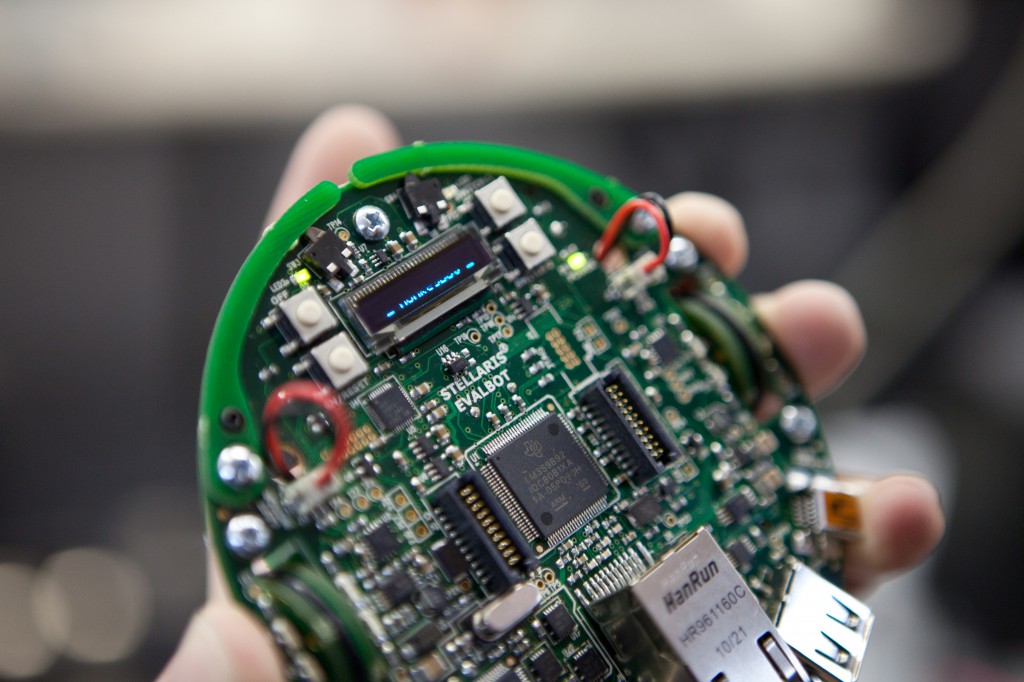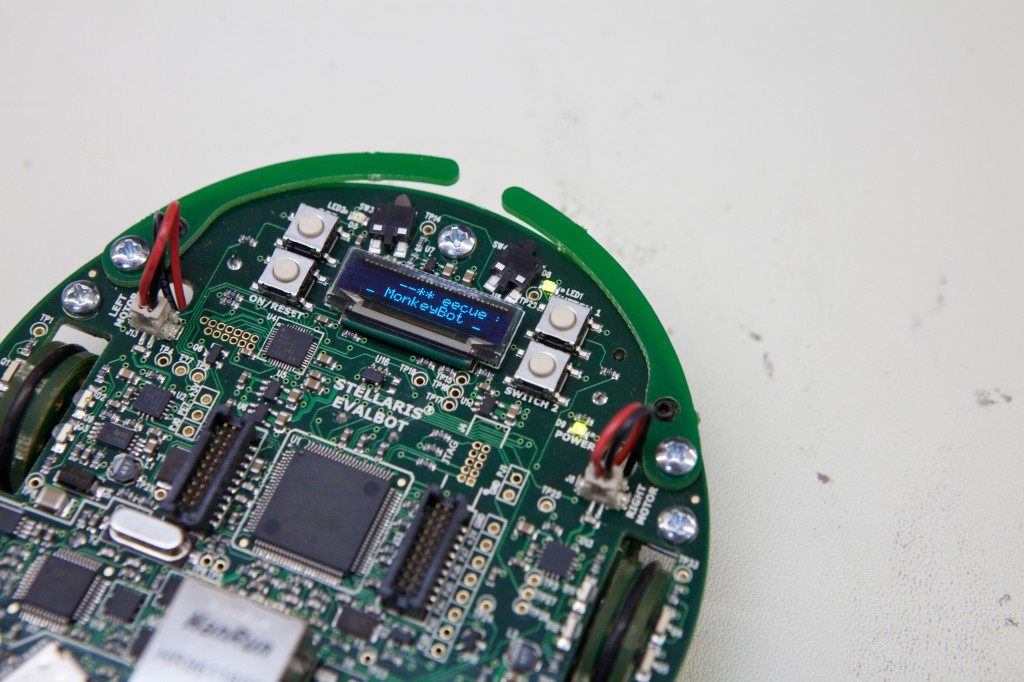Stellaris Evalbot Review and Giveaway and Winners

Texas Instruments recently came out with a fun and powerful development robot based on the Stellaris LM3S9B92 microcontroller. The robot, known as the Stellaris Evalbot, is packed with tons of functionality that leverages the LN2S9B92's robust feature set. The Evalbot comes pre-assembled, with the exception of the wheels and bump arms which take just a few minutes to put together.
First of all, let's talk about the function-rich microcontroller at the heart of the Evalbot: the Stellaris LM3S9B92. The Stellaris, created by Luminary Micro (acquired in 2009 by Texas Instruments) is a 32-bit ARM Cortex-M3 MCU which runs at speeds up to 80Mhz. It sports a wide array of features including:
- 256 kB flash and 96 kB SRAM
- 32 Channel DMA
- 32-bit external peripheral interface
- ROM preloaded with a boot loader, AES and CRC functionality
- 10/100 Ethernet MAC/PHY
- 2 CAN controllers
- USB 2.0 Full Speed OTG/Host/Device
- 2 SSI / SPI controllers
- 2 I2C interfaces
- I2S interface
- 3 UARTs
- 8 motion-control PWM outputs with dead-band
- 2 quadrature encoder inputs
- 4 fault protection inputs
- 3 analog comparators
- 16 channel 10-bit ADC
- 16 digital comparators
- 24-bit systick timer
- 4 32-bit or 8 16-bit timers
- 2 watchdog timers
- Low drop-out voltage regulator
- Up to 65 GPIOs
The Evalbot is the perfect platform for learning about and developing for the LM3S9B92. It takes advantage of nearly every feature included in the Stellaris MCU. The Evalbot is both battery and USB powered, and automatically switches when plugged in to a computer. It features a collection of analog and digital peripherals along with a large amount of breakout pads and headers for I/O expansion. The Evalbot includes:
- MicroSD card connector
- USB Host and Device connectors
- I2S audio codec and speaker
- RJ45 Ethernet connector
- Bright 96 x 16 blue OLED display
- On-board In-Circuit Debug Interface (ICDI)
- Wireless communication expansion port
- Two DC gear-motors provide drive and steering
- Opto-sensors detect wheel rotation with 45° resolution
- Sensors for bump detection
The Evalbot comes preloaded with the μC/OS-III real-time kernel. The Evalbot includes a time-limited version of the IDE (from IAR) you will need to get started programming the bot. Also included is the source code for the Evalbot and some handy in-circuit debugging tools. It's fairly easy to get set up, but runs on Windows only. I was able to flash a modified version of the firmware after just a few minutes of tinkering. My only complaint is that the software is quite expensive to purchase once the trial period runs out.
The Evalbot retails for $149 for the robot by itself or $200 for the robot and a book about programming the μC/OS-III real-time kernel. If you're looking to learn more about real-time systems and play with a powerful microprocessor I highly recommend the Evalbot. As I mentioned in the headline, I have five Evalbots to giveaway, click here for more info about the giveaway.

Giveaway Info:
Texas Instruments was generous enough to send me five Evalbots to give away. I will be drawing drew names from a hat on Black Friday, November 26th. To be entered in the drawing you must [have] meet the following requirements:
- Have a project idea for the Evalbot
- Be a paying member of a hackerspace
- Be willing to share photos and/or a brief writeup once you have completed your project
- Be a US resident (I have to ship these on my own dime)
- Post a comment with your project idea and hackerspace affiliation below
To be entered in the drawing, post a comment below describing your project idea. Don't forget to mention which hackerspace you belong to.
Update:
I drew names out of a hat (literally), here are the winners:
- Clarence Risher from Freeside in Atlanta, GA
- Daryll Strauss from CrashSpace in Culver City, CA.
- Erik Arendall from Makers Local 256 in Huntsville, AL.
- flea from 23b in Fullerton, CA.
- tilver from DenHac in Denver, CO.
- Although not drawn out of a hat, members of Null Space Labs in Los Angeles, CA can use mine.